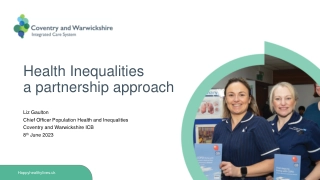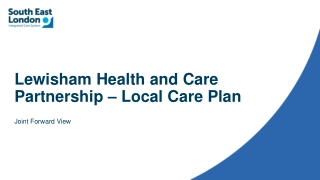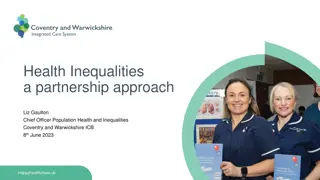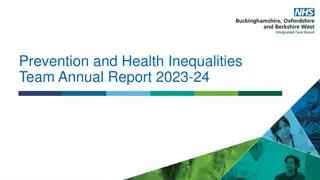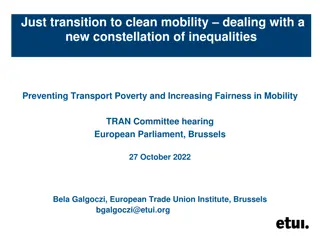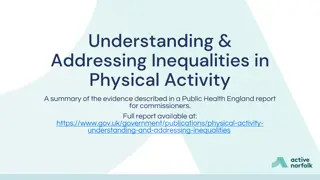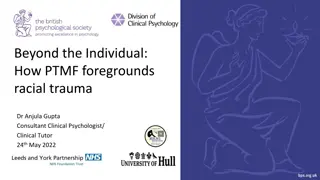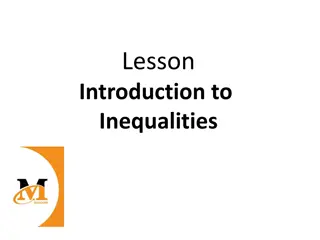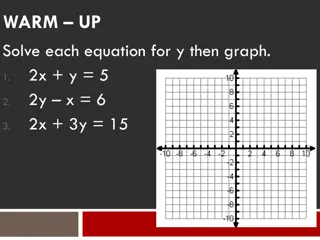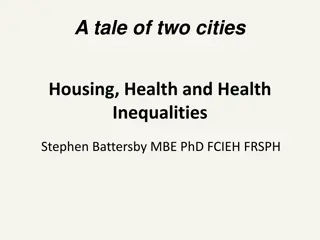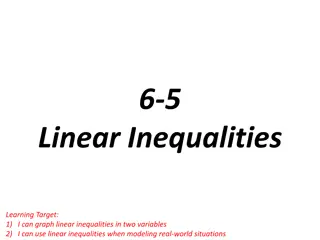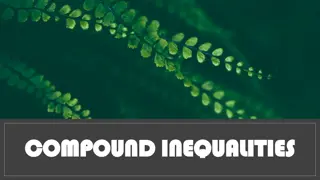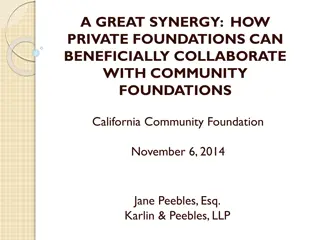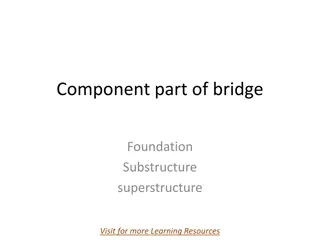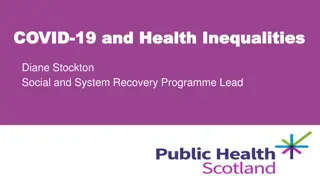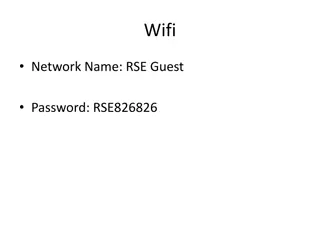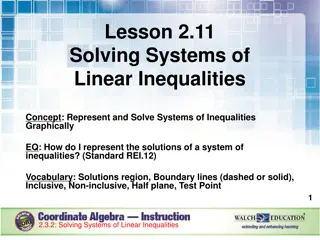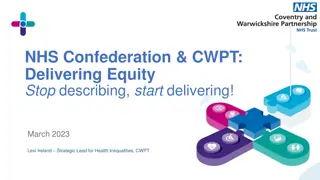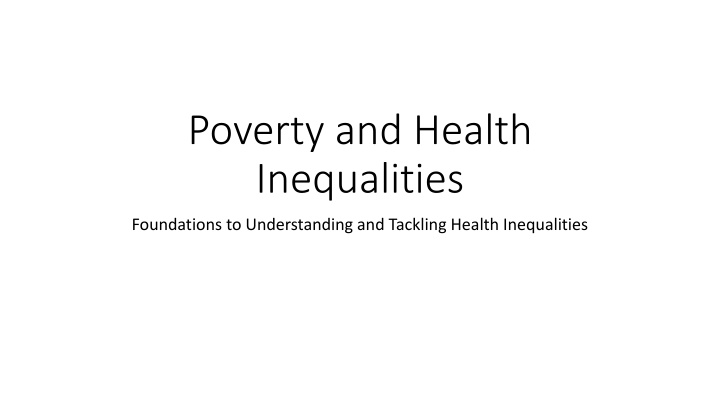
Foundations in Addressing Health Inequalities
Delve into the complex issues surrounding poverty and health disparities, examining global challenges, social determinants, and emerging issues through a comprehensive seminar structure. Explore key readings by experts in the field and understand the critical link between poverty and health highlighted by global leaders.
Download Presentation

Please find below an Image/Link to download the presentation.
The content on the website is provided AS IS for your information and personal use only. It may not be sold, licensed, or shared on other websites without obtaining consent from the author. If you encounter any issues during the download, it is possible that the publisher has removed the file from their server.
You are allowed to download the files provided on this website for personal or commercial use, subject to the condition that they are used lawfully. All files are the property of their respective owners.
The content on the website is provided AS IS for your information and personal use only. It may not be sold, licensed, or shared on other websites without obtaining consent from the author.
E N D
Presentation Transcript
Poverty and Health Inequalities Foundations to Understanding and Tackling Health Inequalities
Introduction 17hSept FOUNDATIONS TO UNDERSTANDING AND TACKLING HEALTH INEQUALITIES An Introduction to Concepts and Theory of Inequality, Equity and Justice Poverty within and Between Countries and Health Inequalities Systems, Resources and Access to Health Introductions PART I Seminar 1 24thSept Seminar 2 1stOct Student Case Studies Seminar 3 8thOct Seminar 4 15hOct Student Case Studies Social Determinants Approach to Health Student Case Studies UNDERSTANDING AXES OF HEALTH INEQUALITIES Gender (ONLINE CLASS) Race and Ethnicity PART II Seminar5 22ndOct Seminar 6 29 Oct 5thNov Student Case Studies READING WEEK Place Seminar 7 12thNov Seminar 8 19thNov Seminar 9 26thNov Student Case Studies Education, Work and Living Student Case Studies Immigration, Migration and Movement of People Student Case Studies EMERGENT ISSUES IN HEALTH INEQUALITY Climate and Environment PART III Seminar 10 3rdDec Seminar 11 10th Dec Seminar 12 17th Dec Student Case Studies Technologies Student Case Studies New issues: Geopolitics to Trade
Readings Walraven, Gijsbertus Engelinus Laurentius. Health and Poverty : Global Health Problems and Solutions. London: Earthscan, 2011. Print. Chapter 1, 10 Manderson, L., Jewett, S. Risk, lifestyle and non- communicable diseases of poverty. Global Health 19, 13 (2023). Gwatkin, D. R. (2000). Health inequalities and the health of the poor: what do we know? What can we do? Bulletin of the World Health Organization, 78, 3-18. Michael Marmot, The Health Gap: The Challenge of an Unequal World: the argument, International Journal of Epidemiology, Volume 46, Issue 4, August 2017, Pages 1312 1318, Sen, A. (1999). Health in development. Bulletin of the World Health Organization, 77(8), 619- 623. Davidson, R., Kitzinger, J., & Hunt, K. (2006). The wealthy get healthy, the poor get poorly? Lay perceptions of health inequalities. Social science & medicine, 62(9), 2171-2182.
Poverty, Health and the UN Poverty is biggest enemy of health in developing world Secretary-General, Kofi Annan tells World Health Assembly : [statement, to the 54th World Health Assembly, in Geneva, 17 May 2001]
-April 2023 (before current conflict) 61.1% population (26.4M) living in poverty (WB Data) - Since conflict this has escalated Starvation in war-stricken Sudan "is almost everywhere", the head of the World Health Organization (WHO) has told the BBC's Today programme after visiting the country. "The situation in Sudan is very alarming... the massive displacement - it's now the largest in the world, and, of course, famine," director- general Tedros Adhanom Ghebreyesus said. He said 12 million people were already displaced, adding that attention in the global community to Sudan was "really low" and race was a factor. - Close to 25 million people - half of Sudan's population - "need support", Dr Tedros said.
Poverty and health outside of conflict settings However: Resource-poor national contexts can deliver health to some (private clinics, health tourism) which therefore intersects poverty with other factors of priviledge/class/power By any measure, at any scale or unit of analysis: Individual/HH/Communi ty/National Poverty creates poor health Poor health creates poverty Impacts capacity to work Less resources for health Low income Low tax recuperation
Poverty, Conflict and Health Conflict in already resource poor settings Conflict become driver of poverty Destroys health systems (Sudan, Gaza) Health (poor health) can trigger conflict- social unrest Epidemics, malnutrition and food insecurity can weaken societal bonds and increase escalation in conflict Greater insecurity & increased conflict Conflict Increases poverty Poor health increases poverty Limits access to health
Classic Theoretical Foundations Marxist Materialist Eco condition, class relations are foundational to life incl. health. Poverty is product of capitalist exploitation causes poor living and working conditions = poor health Poverty structurally embedded in economic system Weber Durkheim (Suicide 1897) Concept of life chances- that enable people to improve QofL: poverty reduce life chance- limits education, health. Soc. Factors like poverty correlate with mental health, soc. Isolation, life expectancy Structural drivers such as class, education, employment Poverty a form os social marginalization material deprivation and also psychological and social disintegration Poverty is a form of social marginalization
Defining poverty Absolute Poverty Fixed threshold tied to minimum resources needed for survival (food, water shelter) Relative poverty Poverty in relation to standards of a given society- focus on exclusion and inequality Poverty is when people lack income/resources to maintain basic subsistence World Bank Poverty of living on less than $1.90 a day
Multidimensional & Rights-based approaches Poverty is violation of human dignity and rights (not just economic) International Covenant on Economic, Social, and Cultural Rights (ICESCR) https://hdr.undp.org/content/2023-global-multidimensional- poverty-index-mpi#/indicies/MPI Deprivations across various domains such as education, health, and living standards Nuanced picture of poverty than income alone. influenced by Amartya Sen's work on capabilities Sabina Alkire Martha Nussbaum
World Bank Poverty Approach 700m live on less than 2.1USD a day (International Poverty Line) Mainly sub-Sah Africa, rural and conflict areas Reduction has slowed since 2015 It sees the relationship between poverty and health as financial, primarily Poverty causes ill health because the poor can t afford health care & food; shelter etc.) Ill-health, in turn, causes poverty: loss of income, sale of assets, debt Countries cannot adequately address poverty without also improving people s well-being in a comprehensive way, including through more equitable access to health, education, and basic infrastructure and services, including digital (WB Last Updated: Apr 02, 2024)
WHO Poverty Approach Links SDGs 1 & 3 Ending poverty is essential to improving people s health and well-being People who live in poverty are more likely to suffer ill health People can improve their standard of living with the support of human rights There are human rights related to poverty for example: Right to an adequate standard of living Right to social security Equal rights of women of all ages in economic life Right to equality and to not suffer discrimination Unequal distribution of last 25 years of eco growth Aid flows dwarfed by debt repayment Poorest quintiles have declining share of national wealth (i.e. income inequality) Gender bias in allocation of resources Inequity in power (pol. eco. Soc. Cul.) root causes
Readings Key Insights Bartley Marmot Material and Behavioral Explanations: Poverty impacts health - material deprivation (resources e.g. clean water, nutritious food, healthcare access) and behavioral differences (smoking etc) Soc Det Health- i.e. social conditions (education, employment, housing) Poverty limits access to these determinants, thus worsening health outcomes. He believes empowering individuals and communities is critical to mitigating the effects of poverty . Income Inequality : Bartley highlights how income inequality, not just absolute poverty. Regions with narrower income gaps (e.g., Kerala vs. the Philippines) exhibit higher life expectancy, even when average incomes are comparable . The Health Gradient - health improves at each step up the social ladder, highlighting that it s not just absolute poverty but relative social status that affects health. Life Course Perspective: Health inequalities accumulate over a lifetime. People born into poverty are more likely to experience health issues at every stage of life, with early disadvantages compounding over time Psycho-Social Stress Model: Poverty is viewed as more than a lack of material resources; it also causes psycho-social stress. Low socio-economic status (SES) results in chronic stress and disease Cognitive and Behavioral Impact of Poverty: Marmot points out how poverty influences decision-making. Due to the constant stress and scarcity associated with poverty, individuals are forced to focus on short- term survival rather than long-term health strategies. This diminishes cognitive function, leading to poorer health choices . Political Determinants: Poverty, for Bartley, is not inevitable it is deeply influenced by political choices, such as how much public housing or welfare states are provided by governments. Countries with more egalitarian policies (e.g., housing and social transfers) show better health outcomes despite similar levels of overall wealth . Life-long accumulations of disadvantage Cognitive burden of poverty and choices and Relational Status
Other Standpoints on poverty and health Executive Function Reduced Executive Function: planning, problem- solving missed appointments, immunizations, adherence to treatments Mani et al. (2013) Cognitive Load Theory Poverty forces people to focus their mental energy on immediate survival needs (money for rent, food, or healthcare. Scarcity mindset" consumes cognitive bandwidth, leaving less mental energy for making decisions about long-term health. Mullainathan and Shafir (2013) argue that poverty traps people in a cycle of poor decision-making due to the mental toll of constantly managing scarcity. Decision Fatigue The constant need to make critical decisions under financial pressure reduces self-control and willpower Decision fatigue linked to poverty has been shown to increase unhealthy behaviors, such as overeating or substance abuse. Haushofer & Fehr (2014): "On the Psychology of Poverty, Stress and Allostatic Load Poverty stress has cumalative biological burden immune system, cardivascular system, chronic pain Adler & Rehkopf (2008)
Questions To what extent is poverty more or less about income, the economy or a government? What do we mean by poverty and to what extent is this a matter for global health actors? How would a capabilities approach address the relationship between poverty and health ? What might we mean by the political economy of health? How might a human rights approach shape politices towards poverty and health? How does neoliberalism impact global health policies in relation to poverty?
Critical thinking questions Do current definitions capture it? Can we view poverty beyond the economy? How would you define poverty? How can we better measure poverty? Do current measure capture the world of the 2030s? How can the cycle between health and poverty be broken? Whose responsibility is poverty?

